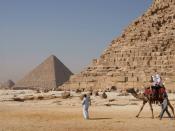As can now be considered common knowledge, the sweeping international phenomenon labelled 'globalization' has called for a review of everything we once simply knew as tourism. Some travel to 'get away', others to see new things and experience foreign cultures, while others appreciate it for the sheer spontaneity it can bring. While globalization is often accredited with the increased ease with which we can now travel (or tour, for that matter), it has also served to render the significance of travel ever more obsolete. The union of travel and globalization unleashes a myriad of direct and indirect implications; the more direct and palpable of which include economic factors such as corporate branding of initially priceless artefacts and homogenization of once unique locales by international corporations. The more subtle, indirect results include the distortion between the classifications of 'tourists' and 'travelers', the plethora of possible motives for travel, and methods of transportation.
Modernity and technology have also played a role in the rapid increase in popularity of tourism, contributing to new trends as tastes and motives for travel evolve over time. With globalization acting as a vehicle for capitalism, tourism has become the world's largest industry, and with that, our collectively capitalist subconscious has driven societies the world over to commodify themselves in attempt to 'cash in on the craze', so to speak. As it already has to every other aspect of our society, globalization has redefined the idea of travel/tourism, eroding the significance of that which was once considered sacred into mere symbols, and opening doors to paths we never before could have even thought to exist.
This world that we so fondly call our own is subtly filled with abstract, essentially useless distinctions used to classify and group anything pertaining even remotely to our lives. One such instance of...


